Key takeaways:
- Understanding and adapting to cultural differences is essential for ethical decision-making in international sales, as ethics can vary significantly across regions.
- Building trust and long-term relationships through ethical practices leads to sustainable business success, contrasting with the temptation of prioritizing short-term gains.
- Establishing a culture of ethics within a team involves leading by example, recognizing and rewarding ethical behavior, and fostering an open environment for discussing ethical concerns.
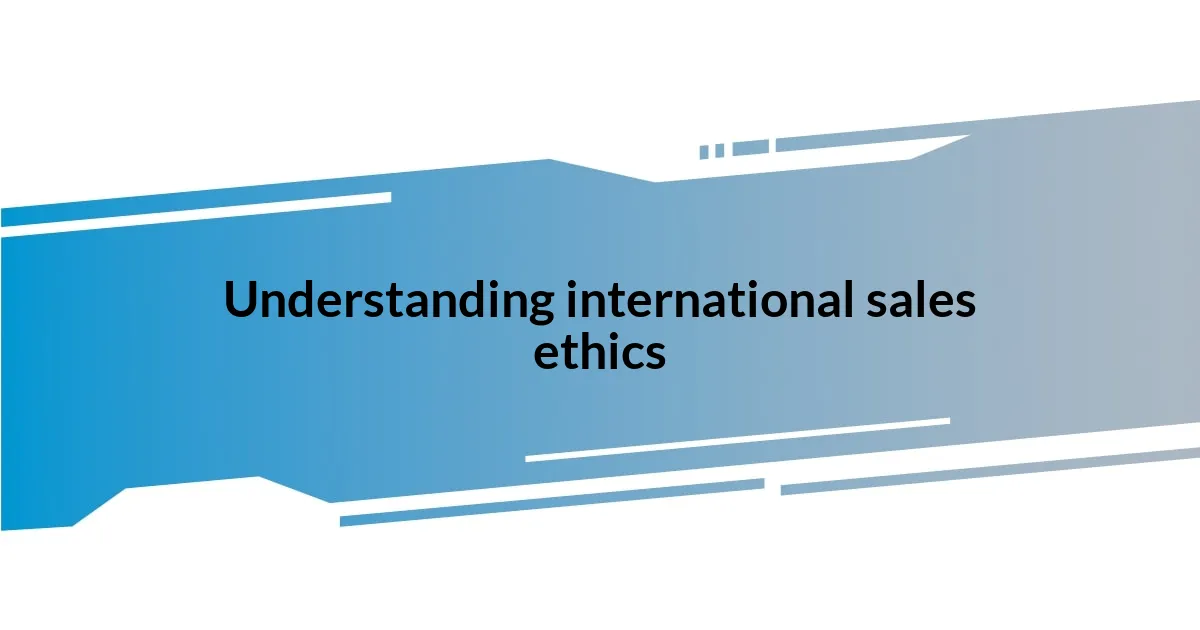
Understanding international sales ethics
Understanding international sales ethics is crucial in today’s global marketplace. Different cultures hold varying values, which means that what might be seen as ethical in one country may not be acceptable in another. I often find myself reflecting on a time when I navigated a delicate negotiation abroad, where understanding local customs was just as important as the sales pitch itself.
I remember that while working with a client from a different culture, I learned the hard way that transparency can be interpreted differently. This experience taught me to ask questions about practices that I’d taken for granted. Isn’t it fascinating how often ethical standards shift based on cultural context? It emphasizes the importance of being open and adaptable to maintain a trustworthy business relationship.
Engaging with diverse markets also means constantly learning and adapting one’s ethical framework. I think about how much richer our professional lives become when we dig deeper into the ethical implications of our actions. What motivates me is the realization that ethical conduct can lead to long-lasting partnerships, fostering trust and respect, which is invaluable in international sales.
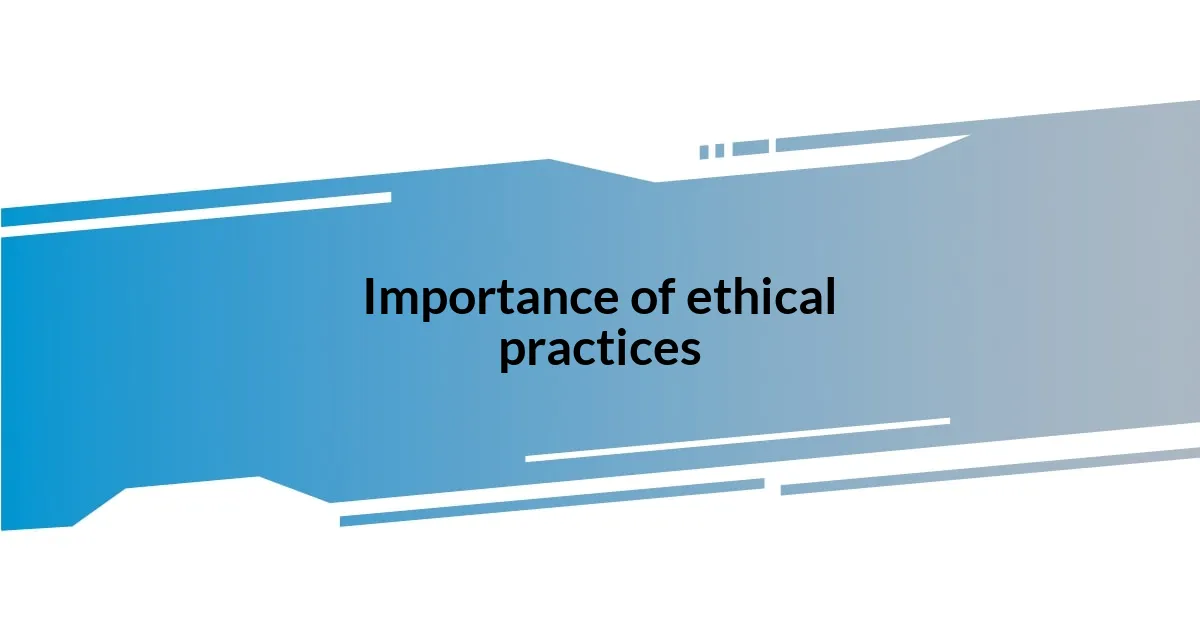
Importance of ethical practices
Ethical practices are the cornerstone of successful international sales. When I reflect on my experiences in cross-border dealings, I realize how vital it is to approach each interaction with integrity. I once had a situation where a potential deal hinged on my willingness to overlook an ethical breach suggested by a local partner. I chose to prioritize ethics over quick gains, which ultimately strengthened my relationship with that partner, as they respected my commitment to fairness.
Here are some key reasons why ethical practices are essential in international sales:
- Trust Building: Ethical behavior fosters trust with clients and partners, creating a solid foundation for future dealings.
- Reputation Management: A solid ethical stance enhances a company’s reputation, making it more attractive to potential clients.
- Risk Mitigation: Adhering to ethical standards can help avoid legal implications, ensuring smoother operations across borders.
- Cultural Sensitivity: Mindfully navigating different ethical landscapes can prevent costly misunderstandings, opening doors to more opportunities.
- Long-term Success: Businesses grounded in ethical practices are more likely to forge lasting relationships that transcend short-term sales.
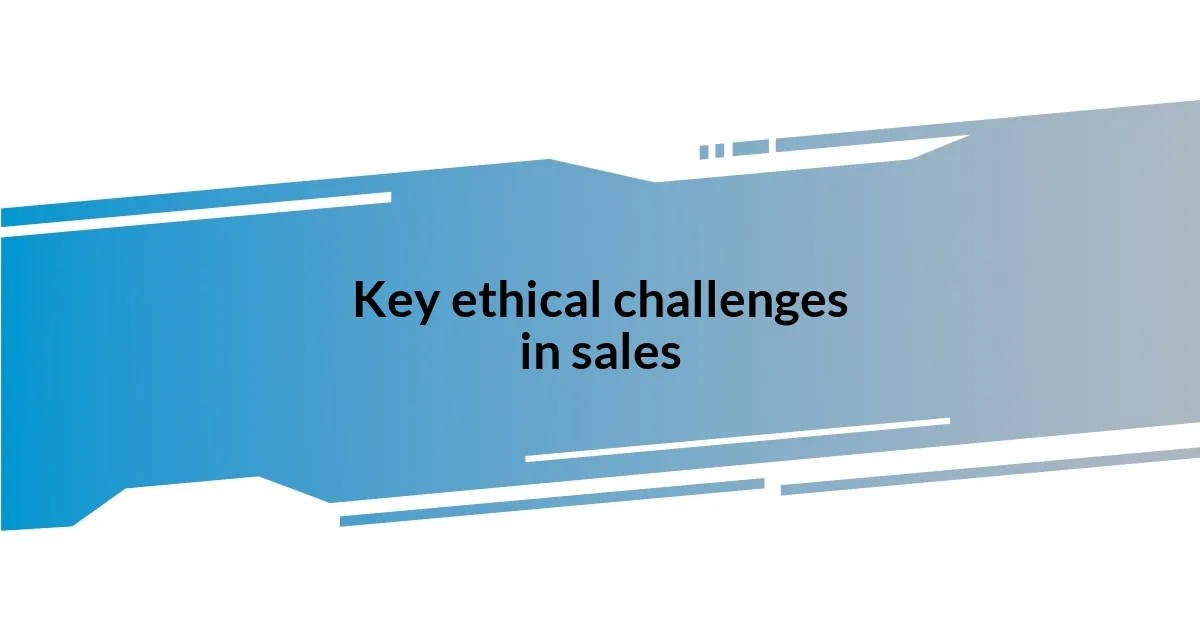
Key ethical challenges in sales
Key ethical challenges in sales are multifaceted, often bridging cultural divides. One of the significant obstacles I’ve encountered is the issue of bribery—a practice that can be a gray area depending on local customs. During a business venture in a foreign market, I was approached with a proposal that included a “facilitation fee.” While it was tempting to consider the shortcut to getting things done, I had to weigh it against my values. That moment reinforced my belief that compromising ethics for expediency can have far-reaching consequences.
Competition is another ethical hurdle that frequently arises. I once found myself in a situation where a rival made misleading claims about their product to gain an edge. It was a tough call for me: should I address it directly or let it slide? I chose to confront the issue, even though it felt uncomfortable at the time. Standing firm on honesty not only distinguished my approach but also showed clients and partners that I valued integrity over mere salesmanship.
Finally, the influence of technology in sales raises ethical considerations related to privacy. There was a particular incident when I had access to customer data that wasn’t fully understood by the local market. I had to ask myself: am I using this information responsibly? I opted to communicate transparently with clients about how their data would be used. This choice not only deepened trust but also set the tone for ethical data practices in future interactions.
| Ethical Challenge | Description |
|---|---|
| Bribery | Negotiating local customs that may include gifts or fees can challenge ethical boundaries. |
| Misleading Competition | Competing honestly against misleading claims requires a strong commitment to integrity. |
| Privacy Concerns | Managing customer data ethically helps maintain trust in a technology-driven market. |
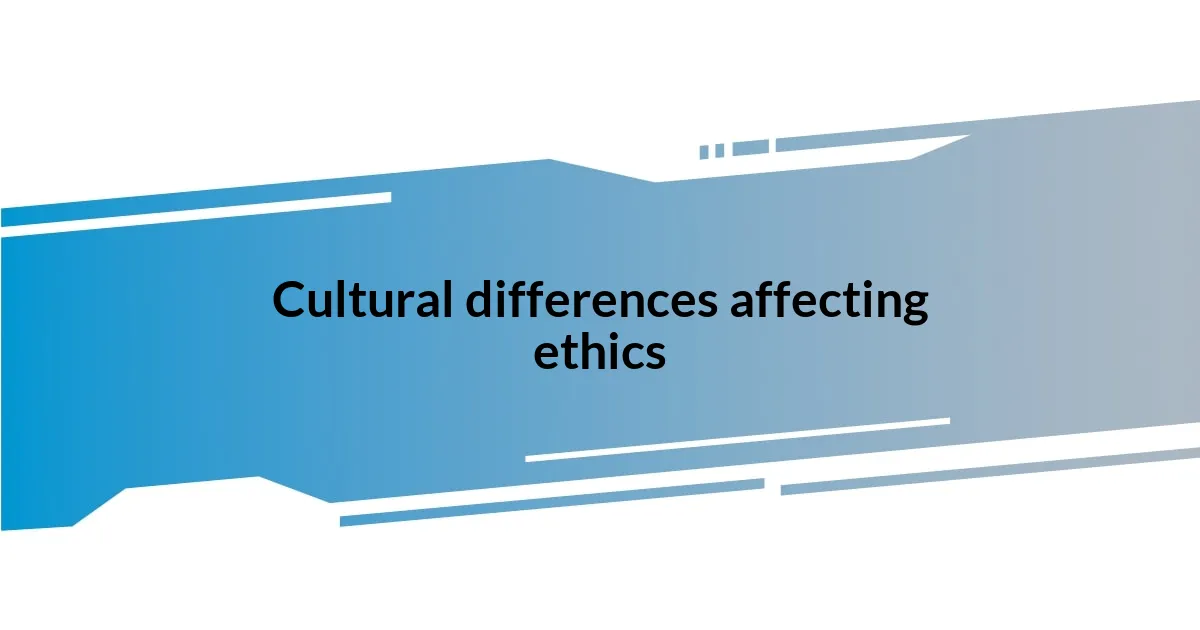
Cultural differences affecting ethics
Cultural differences play a pivotal role in shaping what is deemed ethical in various regions. I once partnered with a firm in Asia where the concept of relationship-building sometimes outweighed formal agreements. There, I was faced with an invitation to partake in a lavish dinner—a seemingly innocent gesture. But I had to reflect: was this a genuine offer of friendship, or was there an expectation tied to it? Navigating such cultural nuances left me acutely aware of how my ethical framework might clash with local practices.
In another instance, while working in Europe, I encountered a scenario involving transparency in pricing. The accepted practice there often included hidden costs that weren’t communicated upfront. I remember the discomfort of presenting my straightforward pricing model. I couldn’t shake off the feeling that I might be considered naive. But I believed this honesty would resonate with the clientele, and it did. The genuine approach not only built trust but also differentiated my brand in a landscape where ambiguity was common.
Moreover, cultural attitudes toward power dynamics can significantly affect ethical perceptions. During a negotiation in South America, the hierarchies were clear, and deference to seniority was expected. I found myself struggling with whether to voice my opinions or conform to the established norms. Ultimately, I chose to express my thoughts respectfully. It was inspiring to see how this maintained my integrity and generated a more meaningful dialogue. How do we find that balance between respecting cultural norms and adhering to our ethical convictions? I believe this challenge is at the heart of successful international sales, reminding us that ethics are not one-size-fits-all but deeply intertwined with the cultural fabric we engage with.
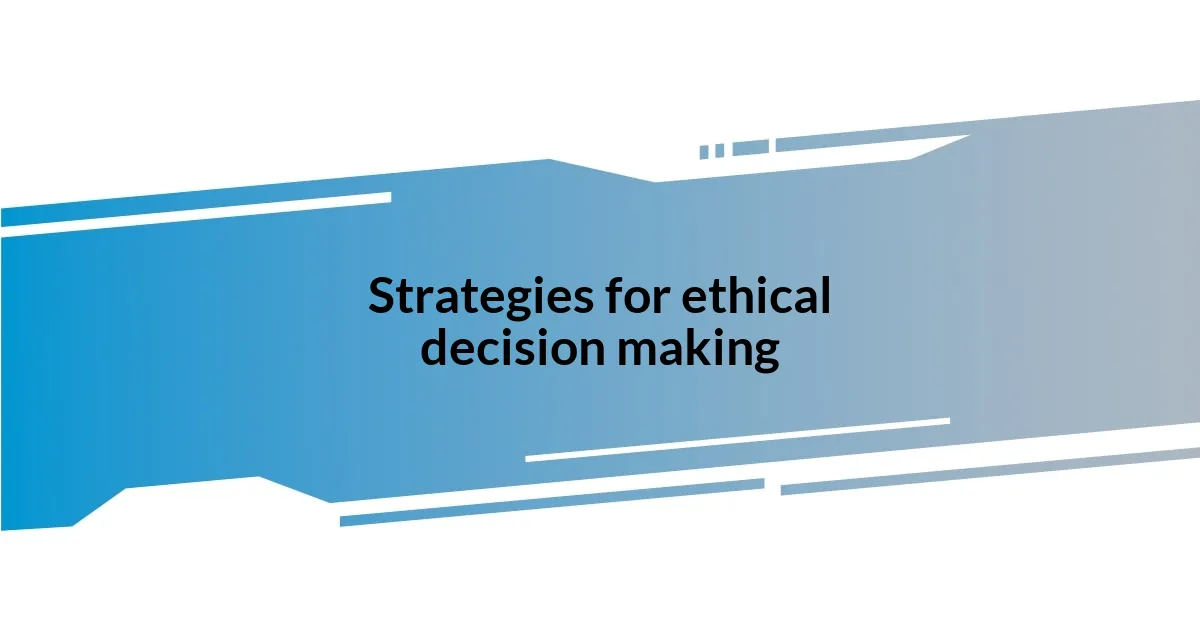
Strategies for ethical decision making
Navigating ethical decision-making in international sales can feel like walking a tightrope. One strategy I’ve found effective is establishing a clear code of ethics that serves as a compass for my team and me. For instance, during a particularly intense negotiation, I recalled our code during a moment of temptation to compromise. Having that framework eased my mind, reminding me that integrity was non-negotiable, and ultimately, that clarity pays off in the long run.
Another approach revolves around open communication. I make it a point to discuss ethical dilemmas with colleagues, tapping into their perspectives and experiences. Recently, during a team meeting, a colleague shared a troubling encounter with a client who expected an unethical concession. This sparked a heated discussion that not only reinforced our values but made it clear that we collectively stand against such practices. Have you ever had a moment where discussing ethics with your team shifted the entire atmosphere? I know I have, and it always brings us closer together.
Lastly, continuous learning is crucial. I dedicate time to attend workshops and seminars focusing on ethics in sales and cross-cultural communication. This commitment not only broadens my understanding but also encourages me to continually reassess my methods. After one such workshop, I realized that my approach could be further informed by ethical theories like utilitarianism, which emphasizes the greatest good for the greatest number. Reflecting on this deepened my resolve to make decisions that are not just legally compliant but ethically sound. Doesn’t that resonate with the idea that we should always strive to improve ourselves and our practices?
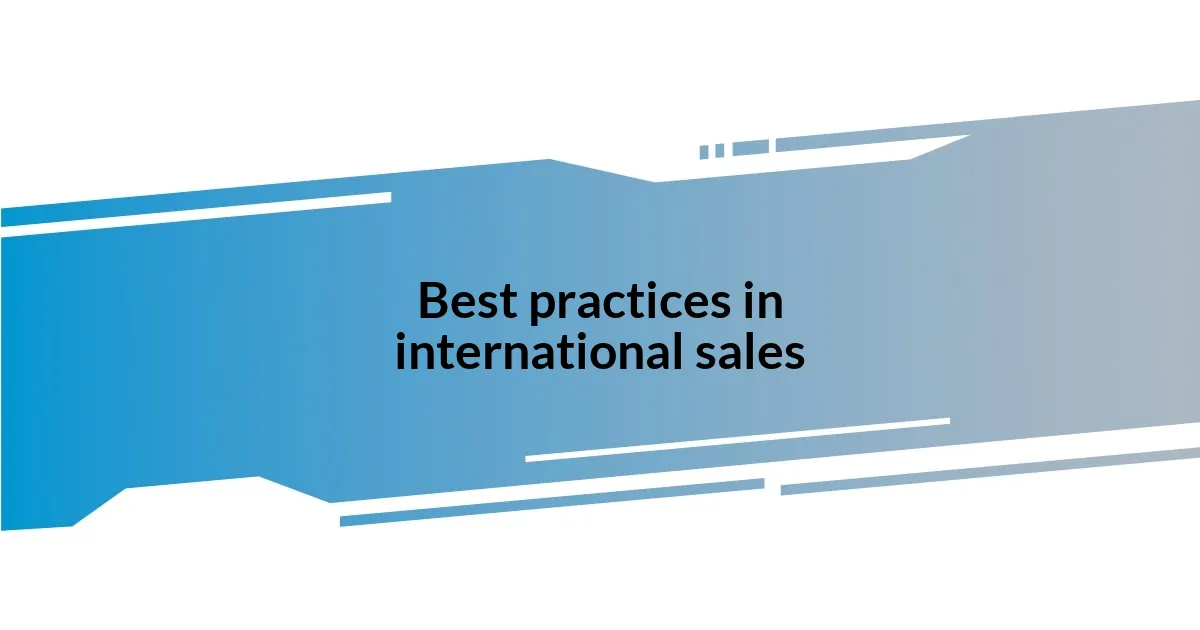
Best practices in international sales
Establishing a solid understanding of local regulations is crucial for successful international sales. I once negotiated a contract in a region where certain practices—like offering incentives—were completely legitimate, while in my home market, those same actions could raise ethical red flags. It was a lightbulb moment for me, highlighting the importance of doing my homework beyond surface-level research. Nothing beats the peace of mind that comes from knowing I’m operating within the bounds of local and international law.
Another best practice revolves around building long-term relationships instead of focusing solely on immediate sales. Early in my career, I rushed to close a deal without investing in relationship-building, and it backfired. The client felt undervalued and ultimately chose a competitor. That experience taught me that a meaningful connection can transform one-off transactions into ongoing partnerships. When people trust you, they’re more likely to return, creating a sustainable revenue stream.
Lastly, fostering diversity within your sales team can enhance ethical decision-making. I remember a time when a diverse group of colleagues brought varied perspectives to a sales strategy meeting. Their insights helped us navigate potential ethical pitfalls more gracefully than a homogenous group could have. Each voice added uniqueness to our approach, making me realize that embracing diversity not only enriches discussions but also aligns our tactics with global ethical standards. How could we overlook that richness while working in today’s interconnected marketplace?
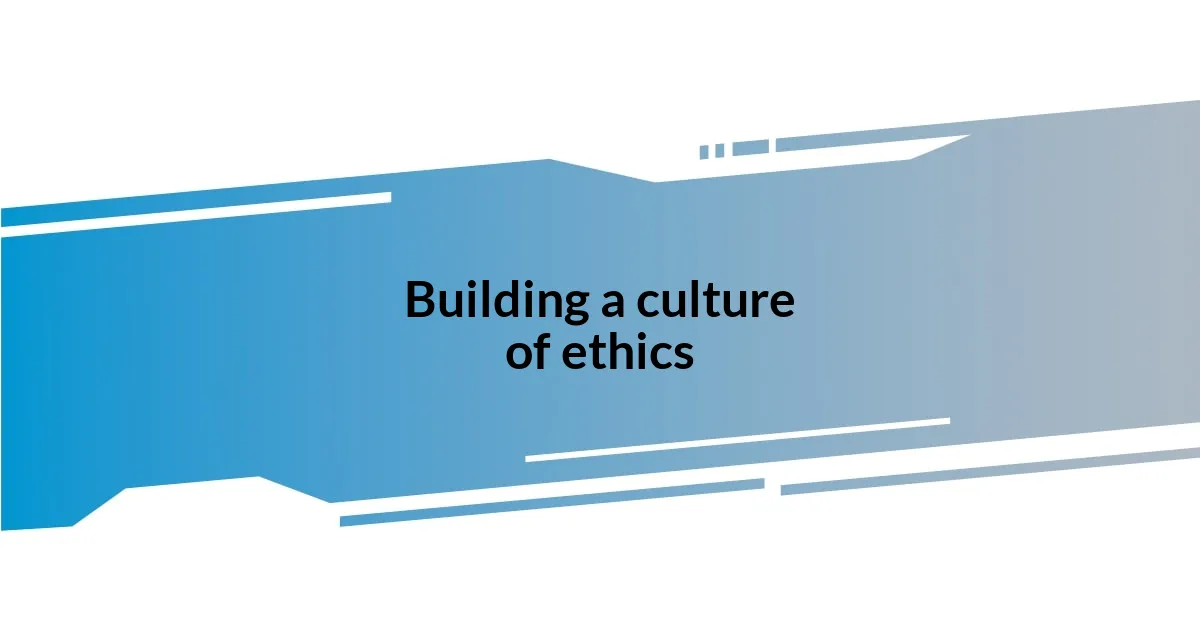
Building a culture of ethics
When it comes to building a culture of ethics, I believe that leading by example is paramount. I recall my first managerial role, where I faced a dilemma regarding a tempting shortcut. Rather than take the easy route, I consciously chose transparency, discussing my decision with the team. To my surprise, this fueled a culture where honesty became our norm. Have you ever noticed how your actions can inspire those around you? That moment taught me that ethical leadership creates a ripple effect, encouraging others to hold themselves and one another accountable.
Equally important is recognizing and rewarding ethical behavior within the team. I implemented a quarterly recognition program, highlighting employees who embodied our values. One time, a colleague turned down a lucrative deal because it conflicted with our ethical guidelines. The admiration from the team was palpable. This practice lingered in their minds, reinforcing that values aren’t just lip service; they’re celebrated. How often do we acknowledge the courage it takes to stay true to our principles in challenging situations? This approach not only elevates morale but also strengthens our collective commitment to ethical sales practices.
Lastly, fostering an environment where employees feel safe to voice concerns is crucial. Early in my career, I worked in a company that heavily emphasized hierarchy, making it uncomfortable for many to speak up. After witnessing some ethical gray areas, I advocated for a more open-door policy. I remember the first time someone expressed discomfort about a sales tactic being used. It was liberating for everyone involved, allowing us to have honest discussions and come to better decisions collaboratively. Have you considered how many valuable perspectives might be lost in a stifled atmosphere? I’ve learned that encouraging dialogue is essential in ensuring that ethics remain at the forefront of our company culture.
